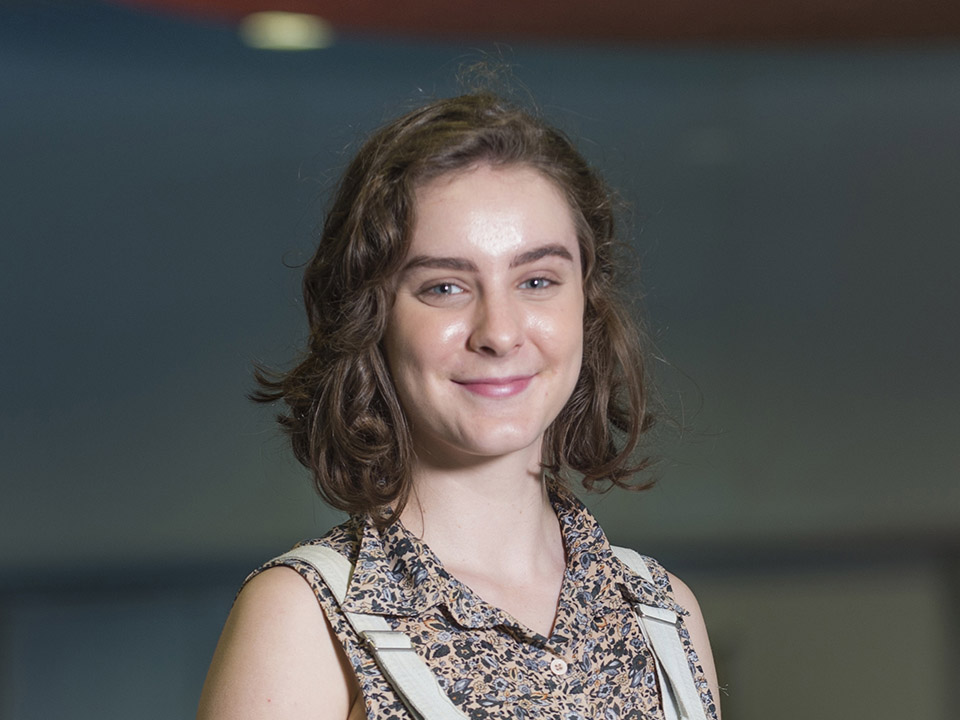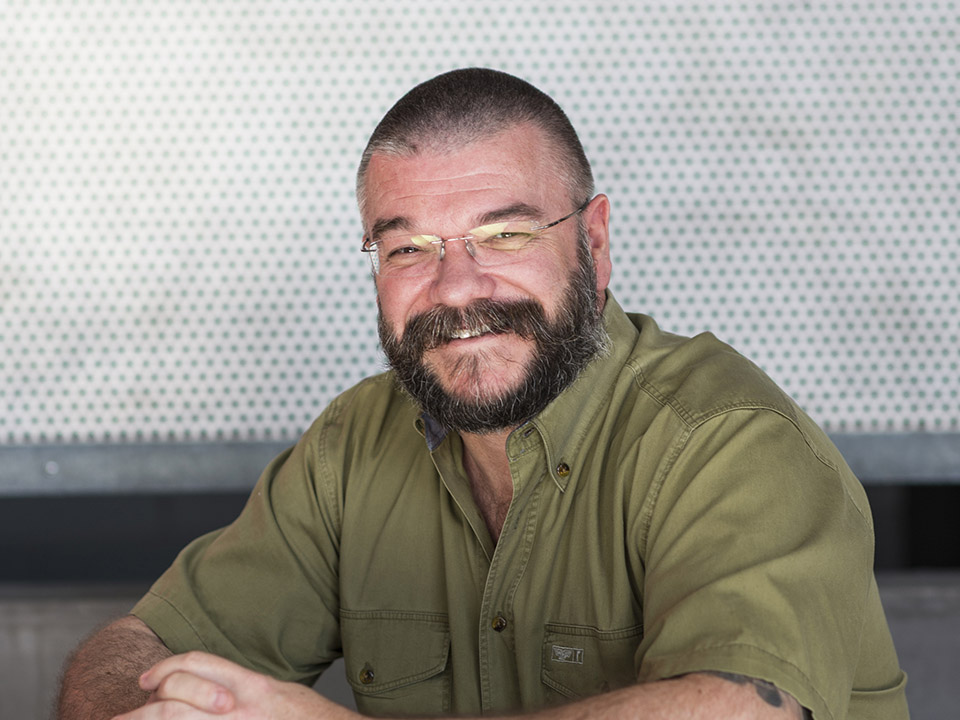Sustainable engineering
‘The skills I have learnt in sustainable and chemical engineering helped me land a position at Aurecon where I’ve been working on an advisory team for the last year. I’ve loved getting to understand the sustainable chemical industry through my studies. One of my favourite projects involved researching the advancements in green hydrogen synthesis for green ammonia production.’
Bachelor of Engineering (Honours) (Chemical and Sustainable Process)
Supporting women in STEM
'Coming from a small mining town, I didn’t think engineering was for me. I really had to step outside the box to study engineering and make the move to Brisbane. It was quite daunting to make such a big change, but coming to QUT, I’ve felt so supported by a community of incredible women I study with.'
Bachelor of Engineering (Honours) (Chemical and Sustainable Process)/Bachelor of Science (Environmental Science)
Environmental impact
'One of my favourite assignments was a collaborative effort to construct a green bridge across the Brisbane River connecting Bulimba and Teneriffe. We proposed sustainable solutions for those communities to reduce city congestion and encourage public transport, walking and cycling. This task deepened my understanding of the general structural and electromechanical processes in engineering, and made me consider government policies and sustainability assessment frameworks in how I approach engineering. These skills will be pivotal for me in my future years as a chemical and sustainable processes engineer.’
Bachelor of Engineering (Honours) (Chemical and Sustainable Process)
Industry-based courses
‘I’ve really enjoyed my subjects with a strong industry focus. In my third year, we looked at emerging sustainable processes that could be implemented to minimise the environmental footprint of operations in a metals refining facility. I have found this mode of learning to be rewarding and engaging and a great opportunity to set me up for leading this kind of work in my future career.’
Bachelor of Engineering (Chemical and Sustainable Process)
Sustainable learning
‘I’m inspired by my lecturer Dr Graeme Millar whose chemical process industry experience has helped solidify my career goals. One of my favourite assignments was a report on the potential uses of green methanol as a sustainable replacement fuel. As a proud Aboriginal and Torres Strait Islander, I am grateful for QUT’s Oodgeroo Unit, which has helped me gain an internship and make industry connections with Honeywell and Arrow Energy. These relationships are pivotal for my career as I finish up my degree.’
Make an impact
‘Studying Chemical and Sustainable Process Engineering allows you to lay the groundwork for an engineering degree that will set you up to make a difference. Whether it’s converting impaired water resources to safe drinking water, developing sustainable materials from mining waste, optimising industrial processes to reduce pollution, you will graduate with the knowledge and skills which allow you to create sustainable engineering solutions that do not compromise our natural environment. And that’s exactly what the world needs.’
Sustainable engineering
‘The skills I have learnt in sustainable and chemical engineering helped me land a position at Aurecon where I’ve been working on an advisory team for the last year. I’ve loved getting to understand the sustainable chemical industry through my studies. One of my favourite projects involved researching the advancements in green hydrogen synthesis for green ammonia production.’
Bachelor of Engineering (Honours) (Chemical and Sustainable Process)
Environmental impact
'One of my favourite assignments was a collaborative effort to construct a green bridge across the Brisbane River connecting Bulimba and Teneriffe. We proposed sustainable solutions for those communities to reduce city congestion and encourage public transport, walking and cycling. This task deepened my understanding of the general structural and electromechanical processes in engineering, and made me consider government policies and sustainability assessment frameworks in how I approach engineering. These skills will be pivotal for me in my future years as a chemical and sustainable processes engineer.’
Bachelor of Engineering (Honours) (Chemical and Sustainable Process)
Industry-based courses
‘I’ve really enjoyed my subjects with a strong industry focus. In my third year, we looked at emerging sustainable processes that could be implemented to minimise the environmental footprint of operations in a metals refining facility. I have found this mode of learning to be rewarding and engaging and a great opportunity to set me up for leading this kind of work in my future career.’
Bachelor of Engineering (Chemical and Sustainable Process)
Make an impact
‘Studying Chemical and Sustainable Process Engineering allows you to lay the groundwork for an engineering degree that will set you up to make a difference. Whether it’s converting impaired water resources to safe drinking water, developing sustainable materials from mining waste, optimising industrial processes to reduce pollution, you will graduate with the knowledge and skills which allow you to create sustainable engineering solutions that do not compromise our natural environment. And that’s exactly what the world needs.’
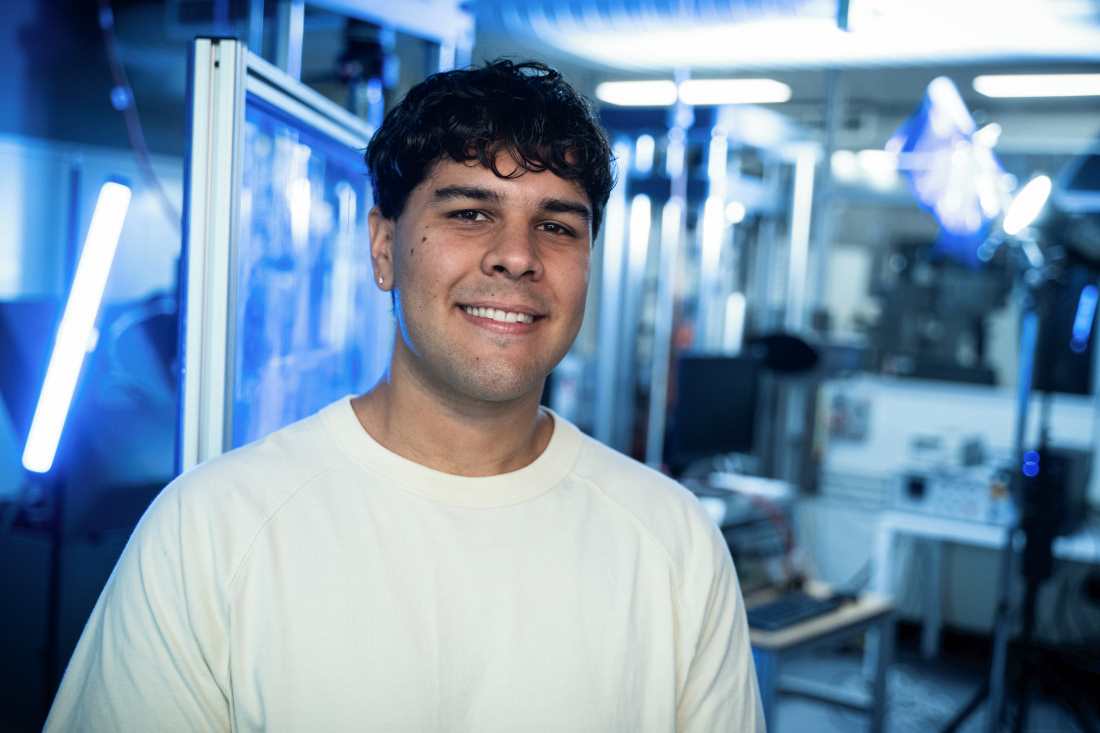
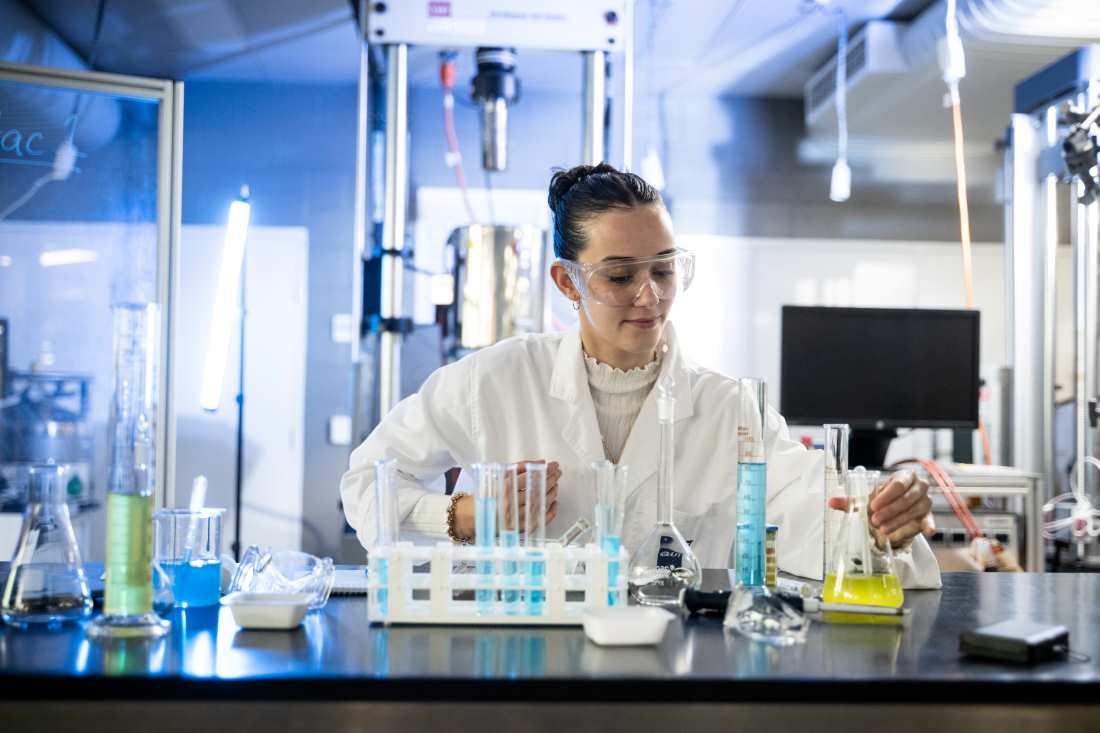

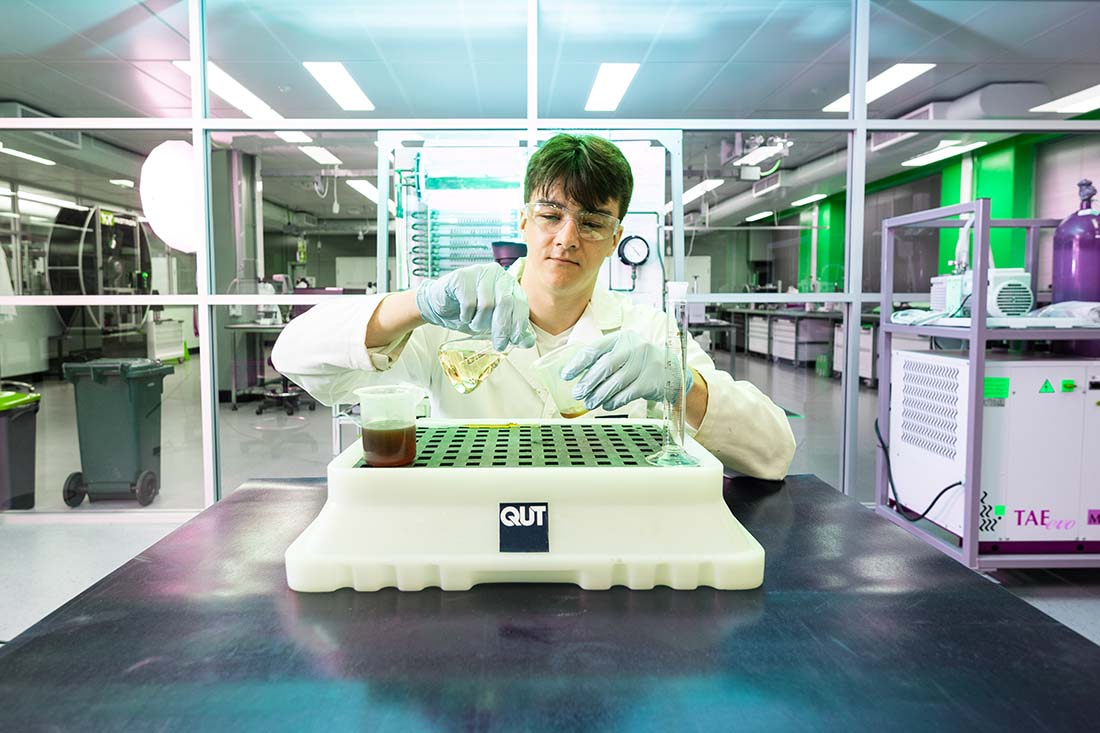
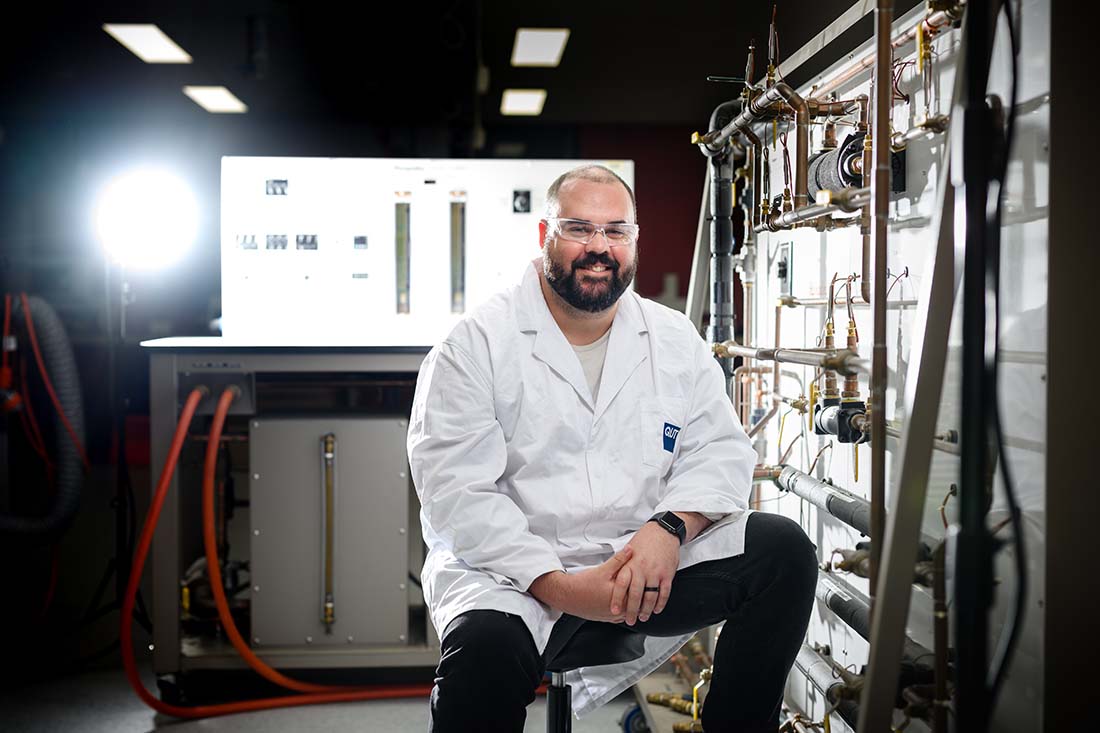
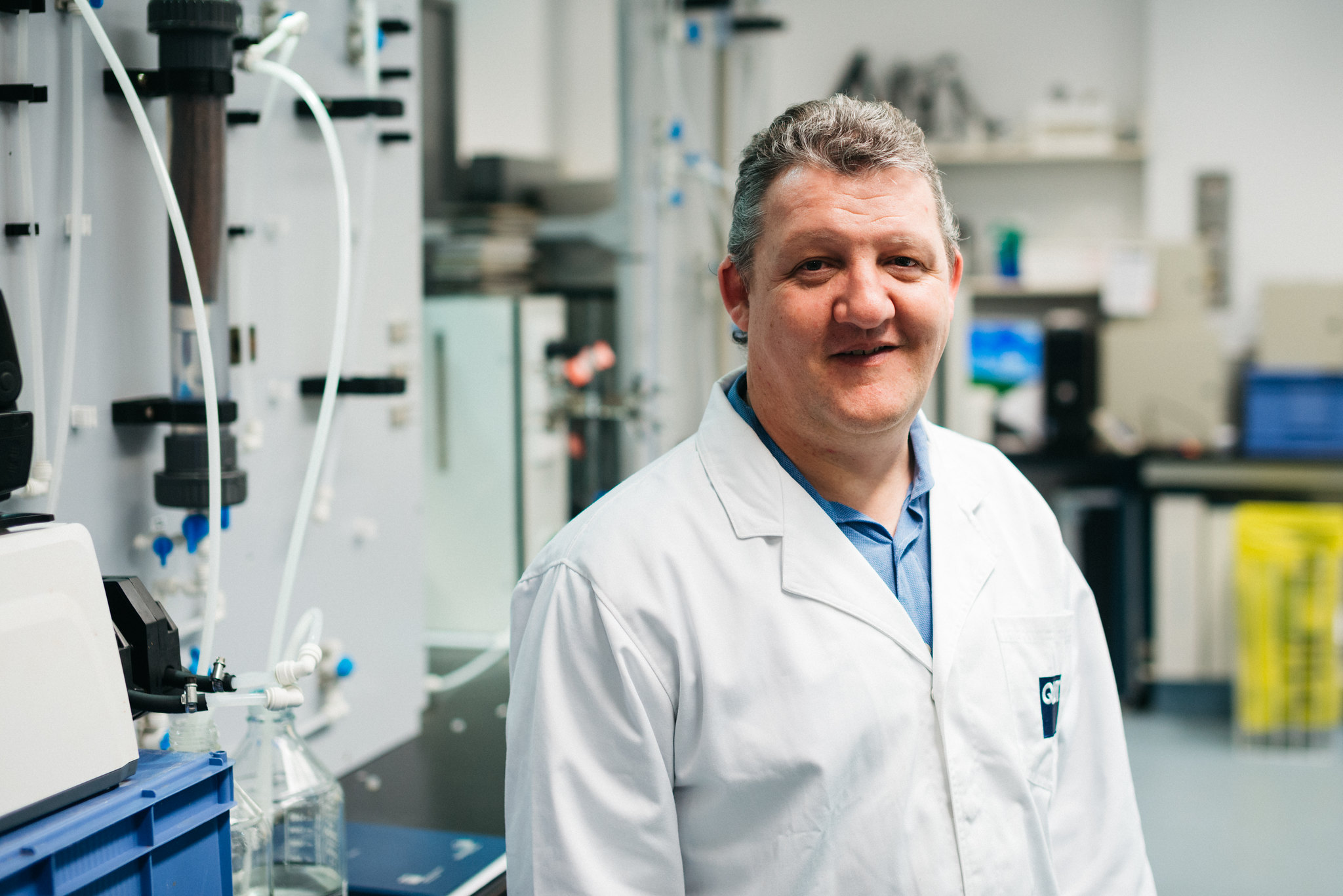




Highlights
- Play an essential role in the manufacturing industry and address challenges such as creating sustainable energy, supplying safe drinking water and creating high-value products.
- Combine engineering, chemistry, circular economy and business principles to design sustainable processes to turn raw materials into useful products.
- In your final year project, you'll take part in workshop-style classes where you will collaboratively produce green chemical engineering solutions for real-world industries such as water desalination plants and paper companies.
- Learn emerging sustainable processes and how they can be applied to minimise environmental impacts.
- Choose a double degree and expand your employment opportunities.
- Gain professional accreditation from Engineers Australia, which will enable you to practice in Australia and overseas.
Highlights
- Prepare for a career in sustainable engineering, one of the top 25 emerging fields in Australia (National Skills Commission, 2021).
- Develop, design and optimise industrial processes for the manufacture of a huge range of outputs including energy, chemicals, materials, foods, bioproducts and consumer goods.
- Combine engineering, chemistry, circular economy and business principles to design sustainable processes to turn raw materials into useful products.
- Gain hands-on experience with site visits, work integrated learning, research projects and assessments aligned with real industrial scenarios.
- Graduate eligible for Engineers Australia (EA) membership and with a highly regarded and internationally-recognised qualification.
Why choose this course?
The job growth for chemical engineers is on the rise as industries adapt to new technologies and sustainability challenges (Employment Outlook, National Skills Commission).
As a graduate of the Bachelor of Engineering (Honours) (Chemical and Sustainable Process) you’ll apply your chemistry, maths and physics knowledge to the energy, mining, materials and manufacturing sectors of the economy.
Throughout your study you'll have access to opportunities for site visits, work integrated learning and research projects through QUT's close connections with industry leaders such as BHP, Glencore Technology, Wiley and Ampol.
Step into your first job with confidence backed by strong project management and leadership skills, ready to approach complex and multidisciplinary challenges.
Explore this course
You’ll learn from experienced professional engineers and scientists that will activate your learning with hands-on experiments, modelling and analysis.
In your final year project, you'll take part in workshop-style classes where you will collaboratively produce 'green chemical engineering’ solutions for real-world industries such as water desalination plants and paper companies.
Work Integrated Learning
Work Integrated Learning (WIL) is embedded in the curriculum and it is a core component for all engineering students. WIL allows you to graduate with a portfolio of professional skills that provides evidence of your professional competencies.
You are required to complete 60 days (equivalent to 450 hours) of approved work experience in the engineering environment as part of your work integrated learning.
Careers and outcomes
An engineer who specialises in chemical and sustainable process develops and optimises industrial processes to make the huge range of products on which modern society depends.
Chemical process engineers have an understanding of the chemistry and physics required for these processes, the related equipment and how to integrate many individual operations into an integrated factory.
Professional recognition
This course has professional accreditation from Engineers Australia (EA). EA is a signatory to the Washington Accord, which permits graduates to work in various countries across the world. This course is recognised internationally in the engineering profession, giving our graduates more career opportunities overseas.
Possible careers
- Chemical engineer
- Consulting engineer
- Industrial engineer
- Operations engineer
- Process engineer
- Process technologist
- Production manager
Engineering (Honours)
Your QUT Bachelor of Engineering (Honours) degree consists of 32 units (384 credit points) arranged as follows:
(a) Core units (96 credit points) consisting of:
60 credit points of First Year units:
- Three core engineering units (36 credit points)
- An introductory unit in engineering mathematics (12 credit points), chosen from a list of two units depending on the student's mathematical preparedness
- Engineering Mathematics and Statistics (12 credit points)
And 36 credit points of Honours units:
- Research Methods (12 credit points)
- Project (24 credit points)
(b) A Major (216 credit points) consisting of:
- Eleven bachelor-level major units in the major (132 credit points)
- Five advanced Honours-level units in the major (60 credit points)
- Two Discipline Extension Units (24 credit points)
(c) Complementary Studies (48 credit points) consisting of:
- An Engineering Minor (a 4-unit sets of 48 credit points) from the options for your chosen Major
(d) Four QUT You units (24 credit points) of your choice.
Engineering (Honours)
Your QUT Bachelor of Engineering (Honours) degree consists of 32 units (384 credit points) arranged as follows:
(a) Core units (96 credit points) consisting of:
60 credit points of First Year units:
- Three core engineering units (36 credit points)
- An introductory unit in engineering mathematics (12 credit points), chosen from a list of two units depending on the student's mathematical preparedness
- Engineering Mathematics and Statistics (12 credit points)
And 36 credit points of Honours units:
- Research Methods (12 credit points)
- Project (24 credit points)
(b) A Major (216 credit points) consisting of:
- Eleven bachelor-level major units in the major (132 credit points)
- Five advanced Honours-level units in the major (60 credit points)
- Two Discipline Extension Units (24 credit points)
(c) Complementary Studies (48 credit points) consisting of:
- An Engineering Minor (a 4-unit sets of 48 credit points) from the options for your chosen Major
(d) Four QUT You units (24 credit points) of your choice.
- ATAR/selection rank threshold
- 82.00
These thresholds are the lowest adjusted scores to which QUT made an offer in Semester 1, 2025.
Don't have a ATAR/selection rank?
- Course code
- EN01
- QTAC code
- 412502
- CRICOS code
- 084921G
-
- Gardens Point
-
- Gardens Point
- 4 years full-time
- 8 years part-time
- 4 years full-time
- February and July
- February and July
Assumed knowledge
Before you start this course, we assume you have sound knowledge of the subject/s listed below. If you don't have the subject knowledge, you can still apply for the course but we strongly encourage you to undertake bridging studies to gain the knowledge:
- English, or Literature, or English and Literature Extension, or English as an Additional Language (Units 3 & 4, C)
- Mathematical Methods, or Specialist Mathematics (Units 3 & 4, C)
Year 12 early offer scheme
If you're a current Queensland Year 12 student, you may be eligible to receive an offer for this course on the last day of Queensland Year 12, before receiving your ATAR or selection rank.
Helping you to get into your course
If you don't think your ATAR or selection rank is high enough to get into this course, you can guarantee your entry with guaranteed advanced standing by upgrading through one the following programs which you can select as one of your QTAC preferences:
QUT College Diploma in Engineering
QUT College Diploma in Engineering graduates will automatically receive an offer to start the Bachelor of Engineering (Honours) within three weeks after completion of the diploma. You will also automatically receive 1 year (96 credit points) credit transfer and be able to complete the degree in 3 years as a full-time student.
Find out more about the QUT College Diploma in Engineering
Dual TAFE-Qld Brisbane/QUT award
If you enrol in a QTAC offer in the following dual TAFE-Qld Brisbane/QUT award you will automatically receive a QUT conditional offer in June (semester 1 QTAC offer) or October (semester 2 QTAC offer) after your enrolment at TAFE-Qld Brisbane is confirmed.
Upon completion of the TAFE-Qld courses you will be able to enrol at QUT. You will also automatically receive
- 1 year (96 credit points) credit transfer and be able to complete the degree in 3 years as a full-time student if you complete the advanced diploma
- Up to 1.5 years (144 credit points) credit transfer and be able to complete the degree in 2.5 to 3 years as a full-time student if you complete the associate degree
More details will be provided in your QUT conditional offer letter.
Offer guarantee
If you achieve an ATAR or selection rank of 84.00 or higher (including any adjustments) and satisfy all other admission requirements, you are guaranteed an offer for this course.
VET guarantee
If you have completed an AQF diploma or higher, and satisfy all other admission requirements, you are guaranteed an offer for this course.
Advanced standing
If you have prior studies or work experience, you may be eligible for advanced standing (credit). You can apply for advanced standing once you've been accepted to QUT. If you're in your first semester of study, you must apply for advanced standing within 10 days of receiving your offer.
Deferment
You can defer your offer and postpone the start of your course for one year.
More about deferring your offer
Adjustments to your ATAR/selection rank
Any adjustments you receive to your ATAR or selection rank will be applied to this course.
Find out if you’re eligible for an adjustment to your ATAR or selection rank
Offers we made to school leavers in Semester 1, 2024
The figures listed in the tables below reflect the offers that were made to recent ATAR students. The entry thresholds box at the top of this page shows the lowest adjusted ATAR/selection rank required to receive an offer for all applicants for the most recent January QTAC offer round.
| Excluding adjustments | Including adjustments | |
|---|---|---|
| Highest ATAR/selection rank to receive an offer |
Selection rank
99.55
|
Selection rank
99.95
|
| Median ATAR/selection rank to receive an offer |
Selection rank
83.65
|
Selection rank
88.00
|
| Lowest ATAR/selection rank to receive an offer |
Selection rank
71.50
|
Selection rank
80.00
|
You can find out more about your fellow students’ backgrounds with this course’s student profile.
Other admission options
If you are of Aboriginal or Torres Strait Islander descent, you may be eligible for admission through our Centralised Assessment Selection Process (CASP).
I completed my studies outside of Australia
Select the country where you completed your studies to see a guide to the grades you need to apply for this course.
If your country or qualification is not listed, you can still apply for this course and we will assess your eligibility.
Assumed knowledge
- Mathematical Methods, or Specialist Mathematics (Units 3 & 4, C)
You must have achieved this study at a level comparable to Australian Year 12 or in recognised post-secondary studies.
I completed secondary school in Australia
Assumed knowledge
Before you start this course we assume you have sound knowledge in these areas:
- Mathematical Methods, or Specialist Mathematics (Units 3 & 4, C)
- ATAR/selection rank
- 82.00
Offer guarantee
If you completed secondary school in Australia and achieve an ATAR/selection rank of 84.00 or higher (including any adjustments) and satisfy all other admission requirements, you are guaranteed an offer for this course.
VET guarantee
If you have completed an AQF diploma or higher, and satisfy all other admission requirements, you are guaranteed an offer for this course.
Minimum English language requirements
Select the country where you completed your studies to see a guide on meeting QUT’s English language requirements.
Your scores and prior qualifications in English-speaking countries are considered. Approved English-speaking countries are Australia, Canada, England, Ireland, New Zealand, Scotland, United States of America and Wales.
If your country or qualification is not listed, you can still apply for this course and we will assess your eligibility.
We accept English language proficiency scores from the following tests undertaken in a secure test centre. Tests must be taken no more than 2 years prior to the QUT course commencement.
| English Test | Overall | Listening | Reading | Writing | Speaking |
|---|---|---|---|---|---|
| IELTS Academic / One Skill Retake | 6.5 | 6 | 6 | 6 | 6 |
|
Cambridge English Score
You must share your results with QUT through the Candidate Results Online website. |
176 | 169 | 169 | 169 | 169 |
| PTE Academic | 58 | 50 | 50 | 50 | 50 |
| TOEFL iBT | 79 | 16 | 16 | 21 | 18 |
Don't have the English language score you need? We can help!
We offer English language programs to improve your English and help you gain entry to this course.
When you apply for this course, we will recommend which English course you should enrol in.
Your actual fees may vary depending on which units you choose. We review fees annually, and they may be subject to increases.
2026 fees
2026: CSP $8,400 per year full-time (96 credit points)
2026 fees
2026: $48,600 per year full-time (96 credit points)
2025 fees
2025: CSP $8,200 per year full-time (96 credit points)
2025 fees
2025: $45,500 per year full-time (96 credit points)
Student services and amenities fees
You may need to pay student services and amenities (SA) fees as part of your course costs.
HECS-HELP: loans to help you pay for your course fees
You may not have to pay anything upfront if you're eligible for a HECS-HELP loan.
You can apply for scholarships to help you with study and living costs.
Women in Engineering Scholarship
A scholarship for future female undergraduate students who want to study engineering.
- Scholarship eligibility
- Women
International Merit Scholarship
A high achievement scholarship for future international undergraduate and postgraduate students.
- Scholarship eligibility
- Academic performance
QUT Budding Entrepreneur Scholarship
A scholarship for innovative individuals who are engaged in their passion for entrepreneurial action.
- Scholarship eligibility
Keep up to date
Ready for your next step?
Finishing school?
Everything you need to know about choosing a uni straight from school.
How to apply
We'll break down the application process, from QTAC to accepting your offer.
Ready for your next step?
How to apply
We'll break down the process, from applying to accepting your offer.
Flexible study
Explore the options that could make postgraduate study work for you.
QUT courses for you
Like to save your courses?
Please enter your first name and email so we can save your courses for you
